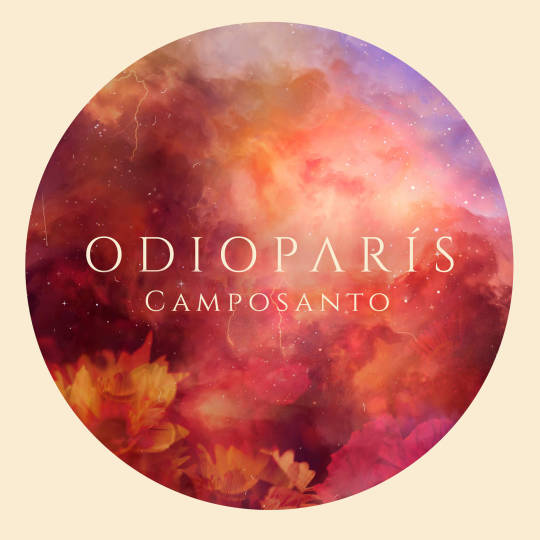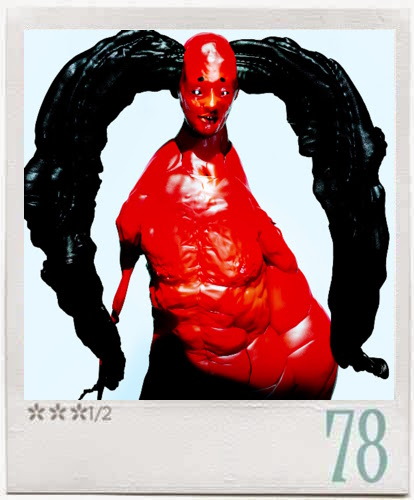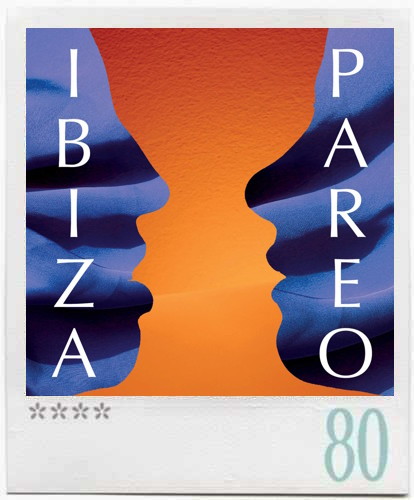Mutant, Arca
Mute, USA/Venezuela
Rating: 78
by Zé Garcia
Remember the nightbus trend that was first articulated in 2009-2010? It was cinematic twilight: arousing, dejected, and demented. Arca's latest is night bus, militarized. Mutant sounds like a nocturnal, imagined war zone. Nighthumvee. Or maybe even nightdrone. Mutant is not as transgressive to the sonic pallet as Xen, less extroverted than Xen's forays into dembow ("Sisters") or the dissimilar reggaeton of Arca's absolute exemplar, "Thievery". Mutant does still feel like Arca is creating the most accurate soundtrack for a generation drowning in electronic excess and informational saturation, behaving and maneuvering erratically because of lived trauma, siphoned potential, and dreams deferred.
On "Alive" emergency response units resuscitate a dormant impulse towards capturing the emotions Arca portrays best: vastness and terror, awe and deep wounds. It sounds like a depersonalized aerial assault, flickering lights (or a flickering humanity). From on to off. For all its tragedy, there is a sense of hope in "Alive", one of the finest tracks of 2015. Like brief calms in a storm, "Mutant" pauses, the sonic walls dissolve & ripple, under siege by weaponry, the melancholy of a guitar like yearning gets codified into the fabric of sonic warfare. "Mutant"- the title track- gives "Alive" a run for the album's crowning achievement.
Alejandro Ghersi has a penchant for making the malformed sound erotic. "Vanity" sounds like something grotesque checking itself out in the mirror, feeling itself, unleashing a scathing wrath onto the listener in its self obsession. Album standout "Sinner" walks runways like "Bullet Chained", vogueing down an alley like a techno insect, sirens in the background, under a police state declared state of emergency. "Anger" almost sounds tropical in its first moments, filtered through a nightmare. "Snakes" is enigmatic, a ceremonial showdown in a cave near the sea at sunrise. A superlative version would feature FKA Twigs leading the ceremony, contorting, bizarre, making the serpents bow down. "Else" is the crystalline shattered pieces of "Held Apart" with added harpsichord. "Umbilical" first appeared on Sheep which I first described as sounding like Chancha Via Circuito purging his insides. "Hymn" and "En" are also taken from Sheep. "Hymn" is sonic anxiety, the cry of an elephant in crisis. "En" is luxurious, throttling, and sexy. "Front Load" and "Enveloped" are a return to Arca's shady, wayward hip-hop beats. The percussive elements of "Enveloped" seem taken from a vignette where artificial intelligence plays table tennis.
"Gratitud" is disconcerting yet inessential at almost 4 minutes. "Faggot" points to an imagined Asia with faint traces of Fatima Al Qadiri's Asiatisch before Arca grabs the luminous machine gun of his sonic arsenal and takes down all the haters. Album closer "Peonies" is also forgettable, nothing close to the epic final moments of Xen or Sheep. The excellent "Soichiro" follows in the steps of this "imagined Asia", deploying that legendary elephantine trumpet. Not sure what "Soichiro" means in the context of Soichiro Honda and the fact that Arca is also the acronym for the Automobile Racing Club of America other than Alejandro Ghersi's music does make for some pretty visionary blunt cruises in fast cars.
I've always described Arca as colossal, an epic Arca de Noé of sound. And although Mutant lives in a similar sonic continuum as Xen (our #4 album of 2014) and the luminary Sheep, Arca will have to increase our sonic threshold soon. We have built a tolerance to Alejandro Ghersi's demented soundtracks. We need a stronger dose.
Ibiza Pareo - Ibiza Pareo
Ibiza Pareo, Ibiza Pareo
Geiser Discos, Argentina
Rating: 80
by Zé Garcia
Sand, water, heat, jungle. These are the words that illustrated an emerging band from Argentina still in its demo phase. Ibiza Pareo "couldn't be more devoted to dance and the sun" the girls explained to me via email: "we are inspired by the sun, nature, travel, and the dance floor". All of these elements are present on the band's self titled debut. Ibiza Pareo sounds like 90s music: alt rock, lounging house, & a lethargic hi-NRG. Ani & Marina perform some compelling vocal performances (wailing in anguish but also rapture) yet the entire album is sung in the shadow of an alluring deadpan delivery. Ibiza Pareo is arid dance music. Ibiza Pareo is tropicgoth.
Second tracks on pop albums are generally a slot reserved for the album's top banger. It is interesting that Ibiza Pareo choose to devote this space to "Viva, Ahí Están los Chicos", a song that only begins to reveal its appeal after repeated listens. This is also true for the rest of Ibiza Pareo, an album that would undoubtedly fall under the "grower" adjective. Ibiza Pareo is a quiet hit with a promise that signals Ani & Marina's best work is still to come. The choice tracks on the record employ a flute that could be described as Andean (think "Suerte"). The beaches of Ibiza don't come to mind while the flute plays, but the Sonoran and the Atacama Deserts do. "Dame un guitarron, esa dulce flauta" Ani & Marina beckon on the foggy safari of "Cha Rup" whereas second single "Ritmas" is the perfect example of the way that flute delves into a more personal space and demands spiritual communion. "Ritmas" sounds transcendant, the keyboards echo, become decidedly house by the end of the first chorus. Where the chorus of "Ritmas" speaks to the soul, the verses are delivered with an attitude befitting Sentidos Opuestos. First single "Arido Espejismo" is a candidate for Record of the Year. A live version has the potential to create something akin to our generation's Negra Tomasa, Ibiza Pareo just has to allow the track to become an all out tropicgoth cumbia. Vocals are pushed to a certain extreme,"Sigo tus huellas movedi-ZAS" the effect is almost psychotic, but the girls catch themselves: "siento la intensidad del aire. Aaaaah". The harmonizing laments (auuuuu, aaaaaah) sound desolate & divine and work as the track's de facto chorus. The flute soars high above the heavens- an avian cry full of stoic pain. The lyrics sound romantic, but their delivery suggests a vía dolorosa: "busco tu imagen en la arena / te veo en el reflejo del sol".
"Viajeros" is another key feature of the many accents of Ibiza Pareo. The synths this time are atmospheric & introspective- the textures of Klaus & Kinski come to mind with the percussive claps of "Triangle Walks". An elegant saxophone meets unrestrained electronic effects channeling a dimension where empathogens, psyschedelics, & a somber poise connect. "Viajeros" (like the rest of the album) is sung in a druggy delirium that is made all the more powerful by Ibiza Pareo's affirmation: the world is in chaos. "Disco de Verano" sounds mischievous and operates like an interlude (in a similar vein to the aptly titled "After") for the road, high from the party you just left, on your way to the next oasis. It is unclear whether the sun is setting or rising: this is for the low-key pregame or the sleep deprived, blissful comedown. "Discoteca" also sounds like an interlude, but this one has lyrics that signal the album's mantra: "que el beat tome mi cuerpo / quiero viajar en el sonido, en la melodía". Six minutes into the trance and you are swept under its somber, spellbinding qualities. "Nuestro Amor Es Musica" takes us on a far out, melodic techno odyssey right before we escape to the cascading closing track of "Tunisia" where synths rise and wane. A guitar wails, the club beat thumps. "Tunisia" becomes impossible not to picture the silhouette of las chicas losing it on guitar and keyboards in a live setting- the strobe lights steady, sweat streaming down your face.
Ibiza Pareo proves that even dance records in the 2015 Club Fonograma sphere carried a moodier tone. A trend towards guitars and distortion will be even more noticeable as our Best Of 2015 lists become available in the days ahead. On Ibiza Pareo, we find ourselves club hopping in the desert. But these days and nights spent turning up aren't vapid. This desert nightclub is a place for introspective wonder, a place to process, celebrate friends, celebrate bodies, movement, & melody. Ibiza Pareo have technically delivered a dance record, a dance record veiled by the morose: "esta noche voy a bailar con mis amigos, celebrar que estamos vivos."
Geiser Discos, Argentina
Rating: 80
by Zé Garcia
Sand, water, heat, jungle. These are the words that illustrated an emerging band from Argentina still in its demo phase. Ibiza Pareo "couldn't be more devoted to dance and the sun" the girls explained to me via email: "we are inspired by the sun, nature, travel, and the dance floor". All of these elements are present on the band's self titled debut. Ibiza Pareo sounds like 90s music: alt rock, lounging house, & a lethargic hi-NRG. Ani & Marina perform some compelling vocal performances (wailing in anguish but also rapture) yet the entire album is sung in the shadow of an alluring deadpan delivery. Ibiza Pareo is arid dance music. Ibiza Pareo is tropicgoth.
Second tracks on pop albums are generally a slot reserved for the album's top banger. It is interesting that Ibiza Pareo choose to devote this space to "Viva, Ahí Están los Chicos", a song that only begins to reveal its appeal after repeated listens. This is also true for the rest of Ibiza Pareo, an album that would undoubtedly fall under the "grower" adjective. Ibiza Pareo is a quiet hit with a promise that signals Ani & Marina's best work is still to come. The choice tracks on the record employ a flute that could be described as Andean (think "Suerte"). The beaches of Ibiza don't come to mind while the flute plays, but the Sonoran and the Atacama Deserts do. "Dame un guitarron, esa dulce flauta" Ani & Marina beckon on the foggy safari of "Cha Rup" whereas second single "Ritmas" is the perfect example of the way that flute delves into a more personal space and demands spiritual communion. "Ritmas" sounds transcendant, the keyboards echo, become decidedly house by the end of the first chorus. Where the chorus of "Ritmas" speaks to the soul, the verses are delivered with an attitude befitting Sentidos Opuestos. First single "Arido Espejismo" is a candidate for Record of the Year. A live version has the potential to create something akin to our generation's Negra Tomasa, Ibiza Pareo just has to allow the track to become an all out tropicgoth cumbia. Vocals are pushed to a certain extreme,"Sigo tus huellas movedi-ZAS" the effect is almost psychotic, but the girls catch themselves: "siento la intensidad del aire. Aaaaah". The harmonizing laments (auuuuu, aaaaaah) sound desolate & divine and work as the track's de facto chorus. The flute soars high above the heavens- an avian cry full of stoic pain. The lyrics sound romantic, but their delivery suggests a vía dolorosa: "busco tu imagen en la arena / te veo en el reflejo del sol".
"Viajeros" is another key feature of the many accents of Ibiza Pareo. The synths this time are atmospheric & introspective- the textures of Klaus & Kinski come to mind with the percussive claps of "Triangle Walks". An elegant saxophone meets unrestrained electronic effects channeling a dimension where empathogens, psyschedelics, & a somber poise connect. "Viajeros" (like the rest of the album) is sung in a druggy delirium that is made all the more powerful by Ibiza Pareo's affirmation: the world is in chaos. "Disco de Verano" sounds mischievous and operates like an interlude (in a similar vein to the aptly titled "After") for the road, high from the party you just left, on your way to the next oasis. It is unclear whether the sun is setting or rising: this is for the low-key pregame or the sleep deprived, blissful comedown. "Discoteca" also sounds like an interlude, but this one has lyrics that signal the album's mantra: "que el beat tome mi cuerpo / quiero viajar en el sonido, en la melodía". Six minutes into the trance and you are swept under its somber, spellbinding qualities. "Nuestro Amor Es Musica" takes us on a far out, melodic techno odyssey right before we escape to the cascading closing track of "Tunisia" where synths rise and wane. A guitar wails, the club beat thumps. "Tunisia" becomes impossible not to picture the silhouette of las chicas losing it on guitar and keyboards in a live setting- the strobe lights steady, sweat streaming down your face.
Ibiza Pareo proves that even dance records in the 2015 Club Fonograma sphere carried a moodier tone. A trend towards guitars and distortion will be even more noticeable as our Best Of 2015 lists become available in the days ahead. On Ibiza Pareo, we find ourselves club hopping in the desert. But these days and nights spent turning up aren't vapid. This desert nightclub is a place for introspective wonder, a place to process, celebrate friends, celebrate bodies, movement, & melody. Ibiza Pareo have technically delivered a dance record, a dance record veiled by the morose: "esta noche voy a bailar con mis amigos, celebrar que estamos vivos."
Video: Adrianigual - "Rap y Amor"
Two months after releasing “Nunca vienes a mi casa,” a Chicago house-influenced banger, Adrianigual brings us his idiosyncratic and modernistic vision of Rhythm & Blues with “Rap y Amor.” Bearing the signature of his current influences: Young Thug and Chayanne, the skillfully measured amalgam emerges at the interface of both a classic rap game aesthetic and a disproportionately free, bold and unrepentant weirdness. Adrianigual is lazy and yet invigorating, touching and fascinating in the same breath. The video, written, directed and edited by Diego Adrián, follows two rebellious heroes fleeing after robbing an ATM. The outlawed pair embodies a liberated love, arrogant, modern. The kind of terrible love we all need to face in those troubled times.
Video: Fakuta - "Luces de Verano"
Oceanic 90s psychedelia, pineapples, Internet Explorer icons, dolphins & the symbol of eternal life (the Ankh) adorn "Luces de Verano" by Fakuta, the Chilean space pop prophet who channeled ghetto goth for the 90s freestyle of "Despacio" and has continued to look forward ever since.
"Luces de Verano" (that features Dënver's Milton on acoustic guitar and production) was likely the least interesting track on 2014's Tormenta Solar- perhaps because of its mainstream crossover appeal. Assimilating towards mainstream radio formats can be met with very mixed reviews and overt skepticism around here, especially when the results are Estilo Libre. But this is coming from a publication that also reviews the likes of Selena Gomez, Plan B, and Shakira. In other words, we are not elitists. Who doesn't enjoy that moment when good music and radio coincide? It took almost a year to fall in love with “Luces de Verano”; its subtle reggaetón tendencies, the steel drums reminiscent of one of the greatest pop songs of all time, and lyrics that unite the cosmic, the seasons, and the interpersonal. Dále Shine- a Chicago based collective I am a part of- even named its 2015 summer mixtape after the song. Calling "Luces de Verano" a blemish back in 2014 was not just totally harsh, it was also a mistake.
References to #seapunk are (hopefully by now) pretty far removed from the ego of those gentrifying white kids who moved from LA to Chicago's Pilsen neighborhood and started having house parties (yeah, I was there once: their house was painted a shade of blue and they brushed their teeth with seafresh toothpaste) where they sold deep sea diving outfits & played aquatically themed Sega Genesis games. Visually, “Luces de Verano” is undeniably indebted to Nenneh Cherry's international sensation, “Buffalo Stance”. Credit to Fakuta for knowing her context.
The fourth single from Tormenta Solar should have been Fakuta's duet with Cristobal Briceño or maybe even "Mascota". And we for sure should have gotten a proper video for "Guerra Con Las Cosas". Still, you can add “Luces de Verano” to the (at times subversive, always stellar) portfolio of Enciclopedia Color who (visually) set fire to that skyscraper in Santiago. Also listen to the bong ready vaporwave remix of "Luces de Verano" by the "ephemeral future / lobby music" project from Nicaragua, h y p e r n o v a 航海ハイ.
Odio París - "Camposanto"

It’s been a minute since we’ve had Odio París in our lives. To be exact, 2011, when they delivered one of the strongest debut LPs of the decade. They’ve recently returned with “Camposanto,” the first single off of their new album Cenizas y Flores, due out early next year. In typical Mushroom Pillow-style, there are plenty of shoegazing tropes to be found. But what makes Odio París special is the level of fury they can exact on very delicate melodies. “Camposanto” never kicks in that extra gear that elevated tracks like “Cuando Nadie Pone Un Disco” to new classic status, but the level of precision is definitely higher. So that’s good. Some more shredding on the album please, though.
Subscribe to:
Posts (Atom)


